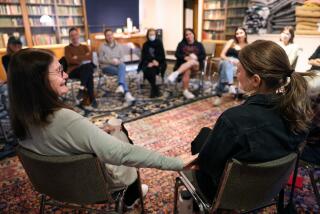DEATH OF THE DUTIFUL OBITUARY
- Share via
A friend in London has sent me an article from the Observer reporting on a radical change Rupert Murdoch has introduced into the once-austere Times of London.
Its obituaries, which used to be the very models of sonorous eulogizing, are now being enriched with the kind of spicy and unfavoring details that might have appeared in gossip columns during the lifetimes of the departed. The old adage about speaking nothing but good of the dead has evidently been buried with them.
The dancer Serge Lifar was said to have achieved his success “by a mixture of beauty, ambition, unremitting hard work and entirely unscrupulous opportunism.”
A Mexican film maker “maintained a passionate temperament which earned him a jail sentence for homicide in 1978.”
Of an Italian novelist: His “problem in the latter part of his career was to avoid becoming a bore. In this he was not always successful.”
It was noted of a prominent economist that when he was in female company, “his appetites were strong and conspicuous.”
The addenda are sometimes merely amusing. The rock promoter Gordon Mills was said to have owned at one time “the largest private collection of orangutans in the world.”
The Italian engineer Candido Jacuzzi, the Times of London noted, also invented the metal monokini “which beggared all previous notions of scantiness.”
Other observations would be libelous in life. The author of the Observer article, Laurence Marks, concluded that the historian John Grigg, who is temporarily editing the Times’ obituary column, “has added a new terror to death.”
It was not always so. When I lived in London, there was a current anecdote about Somerset Maugham attending a dinner party that included the editor of the Times. The conversation turned to the matter of prewritten obituaries. Maugham, then in his late 80s, inquired if that meant his own had been prepared.
The editor, slightly discomfitted, said it had.
Ah, then, said Maugham, might he be allowed to read it?
The editor agreed to send Maugham a proof, and did.
Maugham returned it in a day or two, with a note saying he hoped the editor didn’t mind, but he had run a pencil over it here and there, “just to warm it up a bit.”
The obituary is an art-form, nowhere more so than in Wales, or so the Welsh actor Hugh Griffith once told me. The custom, he said, was to report funerals with the same attention to detail lavished on weddings.
Griffith, memorable as Squire Weston in “Tom Jones” and costumed as a golden cockerel in “Start the Revolution Without Me,” was a lavish raconteur. He recalled the columns-long account of one burying that ended, he insisted, with a note remarking that “the only untoward incident occurred when Mr. Davies, one of the bearers, fell into the grave, breaking a leg and casting a pall over the whole proceeding.”
In this country, the decline of the small town, owner-edited weekly or semi-weekly has made the obituary an endangered item. There was once a sense of personal knowledge, and of personal loss, detectable in every line, or between them.
I still take a hometown weekly, now under distant ownership, largely to keep account of the departing faithful. Admittedly the obituaries from home as they are now are the final democracy, reducing everyone to the minimal statistical facts supplied by the funeral parlors. For as long as I can remember, no one has died on Page 1.
You look in vain for the larger truths about the lives, as that Doc K. was a selfless, tireless general practitioner in a tradition that may have died with him; or that Mrs. J. sang in the choir for getting on to 60 years (occasionally flat but always present), or that Mr. W gave all his free time to keeping the Boy Scout troop alive for years, even after his only son had been killed in the war.
I don’t find these things because those who write and publish, now mostly young people just out of college and working for experience, have no reason to know them.
Metropolitan papers have a different struggle with the problem of obituaries, trying to reconcile too many options with too little space, as for all other coverages. “Why is it so many more people die in the Herald-Tribune than the Times?” was a New Yorker cartoon caption some years ago.
The Murdoch men’s new concept of the posthumous pasting seems a dreadful idea, worse by far than the ritual eulogies, empty as they sometimes are. But it’s at the local level that the offense of ignorance is the most demeaning to lives that may have made a difference in their communities.
The journalism schools could spend a little time on the obituary, and the attentions that ought to be paid. They could call it the Willy Loman Seminar.


